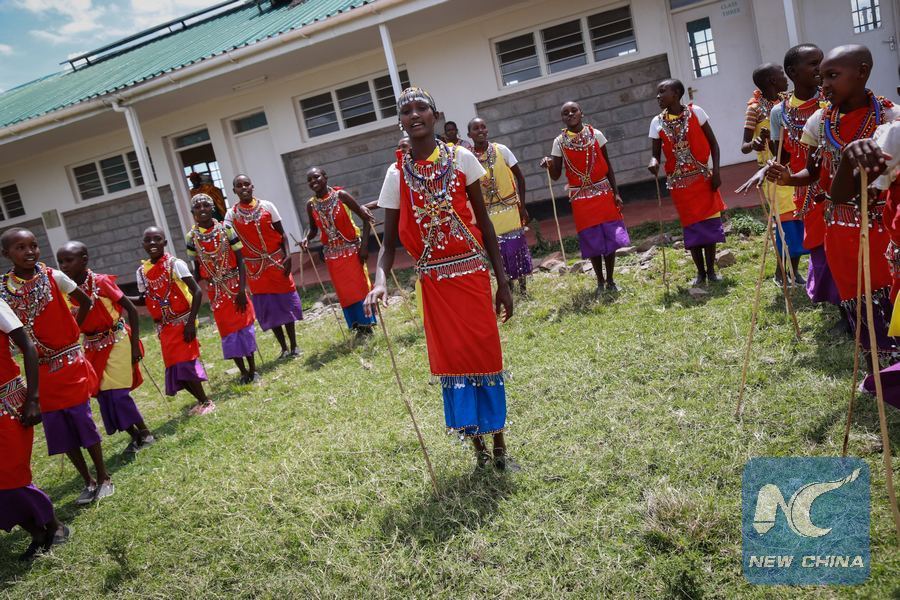
Girls being saved from Female Genital Mutilation (FGM) and early marriage sing traditional Maasai songs, April 16, 2016, in Sekenai village of Narok county, Kenya. (Xinhua/Han Qian)
by Ben Ochieng
SAMBURU, Kenya, Dec. 9 (Xinhua) -- Tucked in north-central Kenya is Samburu County that is inhabited by a community of the same name.
It is a place that seems to have stopped moving ahead with the rest of Kenya, men have the ultimate and final word and where culture is considered the supreme law.
Here, the cultural practice of female circumcision remains a culturally important rite of passage for girls after they reach ten years old and shows little signs of going away.
Also referred to as female genital mutilation (FGM), the practice is the procedure that intentionally alters and in some cases causes injury to the female genital organs for non-medical reasons.
The cut is said to determine maturity in the girls and usher them into womanhood, and those who have not undergone the procedure can be looked down upon.
Female Genital Mutilation (FGM) is outlawed alongside early marriage in 2011 in Kenya. However, in some communities where traditional culture is deeply rooted, the practice is still rampant.
In Kenya, about 28 percent of women aged between 20 and 24 were circumcised. In Africa at large, FGM is practiced among certain communities in 29 countries.
Modern ideas are slowly seeping in, though, and a safer ritual that bypasses the cut to focus on education is taking root.
The African Research Medical Foundation (AMREF) in 2009 developed the alternative rite of passage among the Samburu community and their Maasai cousins in which girls experience all the elements of the circumcision ceremony but not the cruel cut. Over 10,500 have gone through the practice there.
On Wednesday, over 350 Samburu girls in Wamba Division of the county aged between nine and 18 were ushered into womanhood after two-day training at a ceremony where leaders and members of the community embraced the safe alternative rite and expressed their rage over the retrogressive tradition that has serious health implications on the initiates.
The alternative ceremony is characterized by two days of lessons on Maasai values and traditions, sexuality and sexual health issues, and life skills and culminates in a graduation ceremony to symbolize that the girls have transitioned to womanhood without undergoing the harmful cut.
Chairperson of the Anti-Female Mutilation Board Linah Chebii Kilimo urged the community to end the FGM, which was behind the low retention of girls in school, noting that the practice was still common especially in the interior of the county despite the offer for a safer alternative.
"The practice has contributed to high school dropout rates for young girls after undergoing the rite because they are then considered as women and are therefore ripe for marriage," Kilimo noted.
She called for an absolute end to the practice, adding that the fight against the dangerous practice ought to be a multi-faceted matter that involves all stakeholders including the government, media individuals and civil society.
"The law is not there to hurt anybody. The campaign against FGM is out to seek what was lost. I am gratified that a section of morans (warriors) have said they are ready to marry girls who have not undergone the cut where previously they were considered unmarriageable," the chairperson remarked.
Elders told Xinhua the practice began at the time men from the community would go hunting or cattle rustling and could stay in the bush for over a year but when they returned they would often find their wives pregnant or with babies.
"This went on for a long time until the elders came up with practice as a way to reduce the women's libido so that they would wait until their men came back from the bush," said Donald Lepyapuie, a local community leader.
"I fully support the alternative rite of passage because we have been told about the dangers of the female cut. We must allow our girls to go to school because our community has lagged behind for a long time," he remarked.
Another elder, John Nyankala, said the alternative rite of passage will discourage early marriages, adding that parents should be in the frontline to advocate for the discarding of the unhealthy practice.
The Chief of Lapashie Sub-Location where the ceremony took place, Paul Paradisi, said the idea has been well received in the area.
"There is nothing good about female circumcision, which is a painful ordeal and disrupts education," said the chief, who had two daughters under the program.
Samburu East Member of Parliament, Rahael Litimalo, also urged politicians not to shun from preaching against the practice for fear of losing votes.
Kenya enacted the Prohibition of Female Genital Mutilation Act in 2011 that prohibits the female cut and provides that anyone convicted of practicing female circumcision will be sent to jail for seven years or fined 5,000 U.S. dollars.
Anyone who causes death in the process will be liable to life imprisonment, whereas those convicted of aiding, abetting or carrying out such practices will face imprisonment for a term of between three and seven years.

